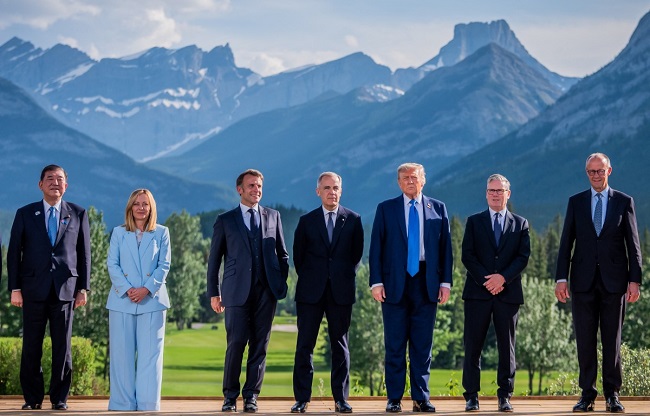(L-R) Japanese Prime Minister Shigeru Ishiba, Italian Prime Minister Giorgia Meloni, French President Emmanuel Macron, Canadian Prime Minister Mark Carney, US President Donald Trump, British Prime Minister Keir Starmer and German Chancellor Friedrich Merz pose for a family photo during the Group of Seven (G7) Summit at the Kananaskis Country Golf Course in Kananaskis, Alberta, Canada on June 16, 2025. (Photo by Michael Kappeler / POOL / AFP)
The Group of Seven (G7) nations announced on Saturday that they have reached a landmark agreement to exempt U.S. multinational corporations from a global minimum tax imposed by other countries. The move marks a significant policy victory for President Donald Trump’s administration, which had lobbied vigorously for the exemption.

Under the new arrangement, U.S. companies will benefit from a “side-by-side” framework allowing them to be taxed exclusively in the United States—on both domestic and foreign income. The agreement was outlined in a joint statement released by Canada, which currently holds the G7’s rotating presidency.
The statement attributed the breakthrough to “recently proposed changes to the U.S. international tax system” included in President Trump’s signature legislative package, which is still under debate in Congress. According to the G7, the side-by-side model is intended to provide “greater stability and certainty in the international tax system moving forward.”
This development comes against the backdrop of a 2021 global tax pact brokered by the Organisation for Economic Co-operation and Development (OECD), in which nearly 140 countries agreed to impose new taxation rules on multinational firms. That agreement included two pillars, the second of which established a 15% global minimum tax. Trump has been a vocal critic of the OECD framework.

Whether the U.S. will ultimately be exempted from the OECD’s global tax regime remains undecided. The G7 stated that it is committed to “expeditiously reaching a solution that is acceptable and implementable to all.”
Earlier on Thursday, U.S. Treasury Secretary Scott Bessent signaled progress, noting that a “joint understanding among G7 countries that defends American interests” was in development. He also urged Congress to drop Section 899 from consideration in Trump’s sweeping legislative proposal, nicknamed the “One, Big, Beautiful Bill.”
Section 899, often referred to as a “revenge tax,” would impose levies on foreign-owned companies and investors from nations accused of taxing U.S. firms unfairly. Critics argue the measure could deter foreign investment in the United States.




